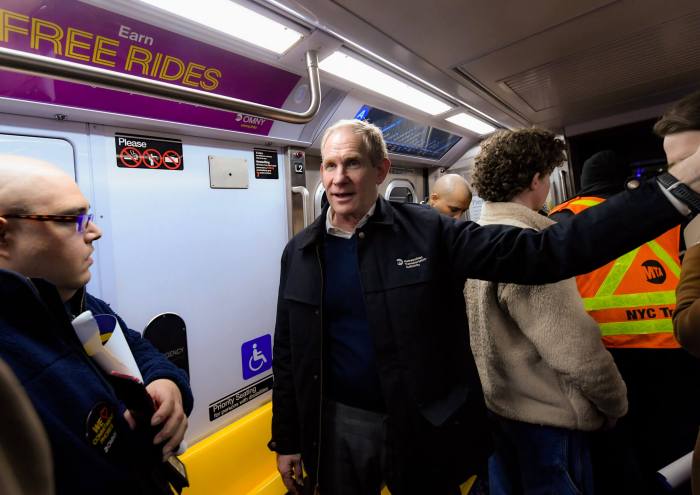
The MTA will meet for an “emergency” board meeting on Tuesday to discuss Gov. Andrew Cuomo’s last-minute proposal to halt the L train shutdown.
The public meeting will be held at noon in MTA headquarters, 2 Broadway, where board members are expected to grill the agency on the legitimacy and feasibility of the newly devised strategy to rehabilitate the line’s Canarsie Tunnel without the long-planned 15-month, total shutdown of L service to Manhattan. Ultimately, the board will need to approve the cancellation of the L train shutdown.
The consulting firm WSP will present the details of the new plan, which would avoid the complete shutdown by adjusting how the MTA rehabilitates the superstorm Sandy-damaged tunnel. Extensive service disruptions, however, still would be needed on nights and weekends to complete the work over the course of at least 15 to 20 months.
“WSP will be recommending to the board that it pursue the modified plan as a better alternative, as it does not require a total shutdown of L train service,” the MTA wrote in a news release. “The Board will also be discussing the concept of hiring a new consultant reporting directly to the Chairman and the Board to oversee operation, oversight and precautions for the L train and the tunnel reconstruction.”
Instead of a complete replacement of the tunnel’s concrete bench walls, which encase power and communication cables, that wiring will be “racked” high on the tunnel walls. Badly damaged sections of the bench wall will be removed and the MTA would use a fiberglass polymer to coat and fortify the remaining sections — a strategy used on bridges and buildings, but untested in subway tunnels.
The announcement of the meeting on Sunday came as somewhat of a surprise, with many questions lingering around the new plan.
Cuomo earlier in January had called for the MTA to hold the emergency board meeting to discuss and vote on the proposal, but NYC Transit president Andy Byford has since dismissed that the body could meet this quickly. Byford said last week that he would need at least until the MTA’s regularly scheduled board meetings, to begin a week from Tuesday, to complete a “due diligence” report on the plan.
“I’m now undertaking a due diligence exercise to look at the outstanding questions that I have from a safety perspective — I’ve got some questions around certain aspects of the operation, including how the racks will be fitted to the tunnel, how we’re going to remove dust, or control dust,” Byford said last week.
“I’m trying to get that done by the January [board meetings] but if it isn’t done, I’m not going to rush it,” Byford added. “It’s got to be done properly. I’d rather start it a little later than rush it and not do it properly.”
At least one board member, Veronica Vanterpool, was caught off-guard by the meeting, which she derided as a “publicity stunt.” She tweeted Sunday that she had found out that the meeting would be held shortly before the MTA’s announcement, and that the board won’t be voting on the plan.
“Yet, NO ACTION is to be taken at this mtg,” she said on Twitter. “[The board] can discuss next week. Instead, spending time & limited resources for a publicity stunt.”
Despite what Vanterpool described as a last-minute warning of a meeting that the MTA’s transit president indicated wouldn’t happen, MTA spokesman Shams Tarek said in a statement that he hopes the board “view[s] this as an important opportunity and attend.”
“In light of intense public interest in the new plan to avert a shutdown of the L Tunnel, this meeting will allow board members and the public to learn more about and discuss one of New York City’s most critical infrastructure projects,” Tarek said.
Tarek did not address questions as to the status of Byford’s review.
It is still not clear if the federal government would need to approve elements of any new rehabilitation plan, which could significantly delay any new approach.
Several board members, in the meantime, have promised thorough oversight of the process.
“Tough questions are going to be asked for sure,” said Andrew Albert, a nonvoting member of the board, last week.

















